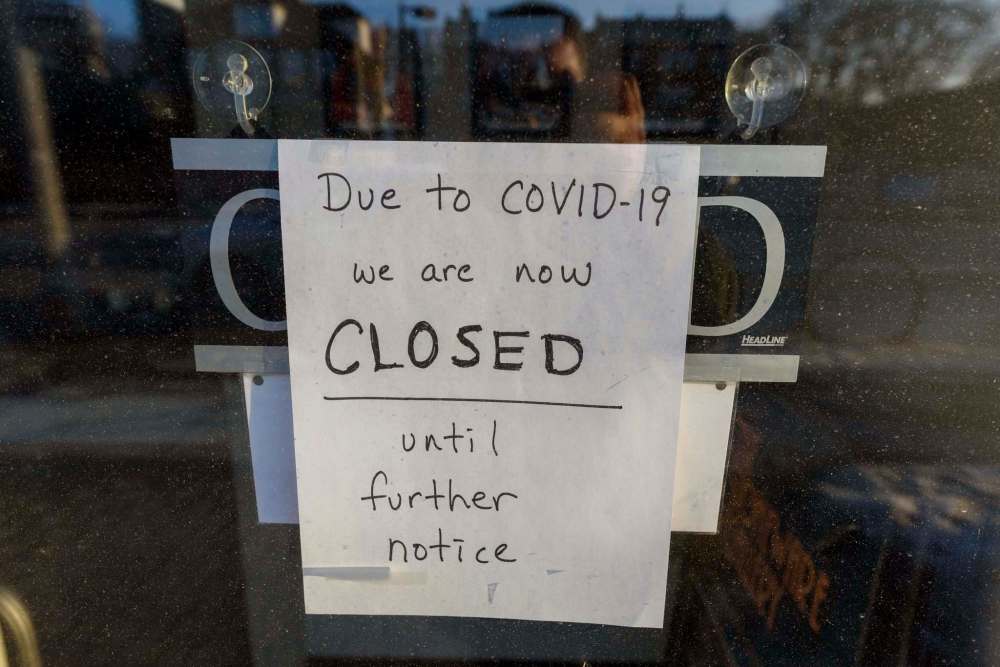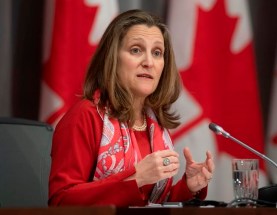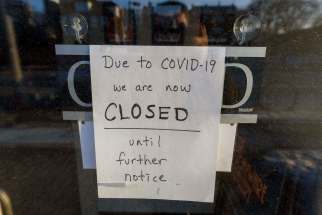Local businesses need direct financial aid
Read this article for free:
or
Already have an account? Log in here »
To continue reading, please subscribe:
Monthly Digital Subscription
$0 for the first 4 weeks*
- Enjoy unlimited reading on winnipegfreepress.com
- Read the E-Edition, our digital replica newspaper
- Access News Break, our award-winning app
- Play interactive puzzles
*No charge for 4 weeks then price increases to the regular rate of $19.00 plus GST every four weeks. Offer available to new and qualified returning subscribers only. Cancel any time.
Monthly Digital Subscription
$4.75/week*
- Enjoy unlimited reading on winnipegfreepress.com
- Read the E-Edition, our digital replica newspaper
- Access News Break, our award-winning app
- Play interactive puzzles
*Billed as $19 plus GST every four weeks. Cancel any time.
To continue reading, please subscribe:
Add Free Press access to your Brandon Sun subscription for only an additional
$1 for the first 4 weeks*
*Your next subscription payment will increase by $1.00 and you will be charged $16.99 plus GST for four weeks. After four weeks, your payment will increase to $23.99 plus GST every four weeks.
Read unlimited articles for free today:
or
Already have an account? Log in here »
Hey there, time traveller!
This article was published 08/04/2020 (2076 days ago), so information in it may no longer be current.
Premier Brian Pallister says we have to ensure the provincial government is still standing once the COVID-19 outbreak is over. The premier has made the comment more than once in response to calls for greater financial aid for various sectors of the economy, including small business.
Like all governments in Canada, Manitoba will have to borrow billions of dollars this year, not only to cover COVID-19-related costs, but also to replace lost tax revenue. Mr. Pallister is implying that if the province subsidizes too many sectors of the economy, it will drain the provincial treasury and there won’t be a provincial government left when the outbreak is over.
What the premier ignores, though, is there won’t be much of a small-business sector left if government doesn’t act quickly to rescue it.

While larger companies may be able to weather the pandemic and return to normal production in the weeks or months ahead, many small outfits won’t make it. That’s especially true in the hospitality industry. Large corporate entities, including fast-food outlets, have the resources and means to keep their heads above water. Many can still generate revenue, for example, by continuing to operate as drive-thru outlets. But smaller bars, restaurants and cafes, which have been mandated by government to close, have had their revenue plummet. In many cases, they have no income at all.
While the federal government’s promised 75 per cent wage subsidy will help some small businesses remain solvent, many either don’t qualify or can’t open, even with a wage subsidy (despite recent improvements to the program). Wage subsidies don’t help companies whose revenues have completely dried up.
The Canadian Federation of Independent Business found in a recent survey that 37 per cent of its members across Canada said the wage subsidy won’t help them retain staff. Almost one-third of CFIB businesses are already closed.
There are other federal programs, such as the Canada Emergency Response Benefit, that employees and the self-employed can access. But those don’t help small firms, many of which continue to have fixed costs such as rent, utilities and property taxes. Without financial aid, thousands of small businesses will have to close. Many will not have the capital to reopen once the pandemic subsides.
Business groups have called on provincial governments to fill in the gaps. Specifically, provinces are being asked to subsidize the rent and other fixed costs of small businesses to allow them to remain solvent. Doing so would permit many to reopen after the pandemic is over.
Business groups have called on provincial governments to fill in the gaps. Specifically, provinces are being asked to subsidize the rent and other fixed costs of small businesses to allow them to remain solvent. Doing so would permit many to reopen after the pandemic is over. It would not only ensure the survival of a substantial portion of the small business community, it would help accelerate the province’s economic recovery, including generating much-needed tax revenues for government.
The Pallister government has taken some measures to help individuals and small businesses, but they are minor. Deferring property taxes, for example, does nothing for a small business on the verge of insolvency.
The province needs to provide immediate financial aid to small businesses to help cover their fixed costs. They need a cash infusion now to help keep them afloat. The province would have to borrow even more to make an investment of that magnitude, but the return on investment would be substantial. The alternative, a substantially eroded small business sector, will cause far more long-term economic damage.





